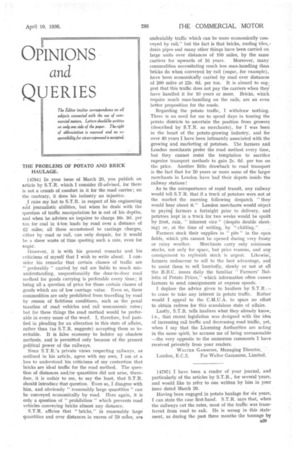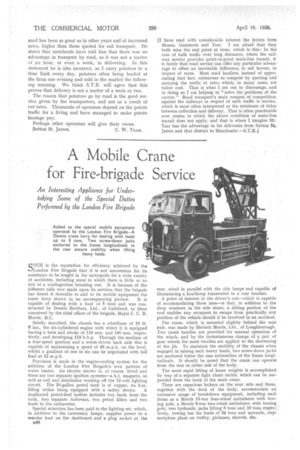OPINIONS and
Page 53

Page 54

If you've noticed an error in this article please click here to report it so we can fix it.
UERIES
THE PROBLEMS OF POTATO AND BRICK HAULAGE.
(47841 In . your issue of March 20, you publish an article by S,T.R. which I consider ill-advised, for there is not a crumb of comfort in it for the road carrier ; on the contrary, it does his industry an injustice.
I raise my hat to S.T.R. in respect of his engineering and journalistic abilities, but when he deals with the question of traffic manipulation he is out of his depths, and when he advises an inquirer to charge 16s. 9d. per tcin for coal in 4-ton loads by road over a distance of 62 miles; all those accustomed to carriage charges, either by road or rail, can only despair, for it would be a sheer waste of time quoting such a rate, even for sugar.
However, it is with his general remarks and his criticisms of myself that I wish to write about. I consider his remarks that certain classes of traffic are " preferably " carried by rail are liable to much misunderstanding, unquestionably the door-to-door road method for goods carrying is preferable every time; it being all a question of price for those certain classes of goods which are of low carriage value. Even so, these commodities are only prohibited from travelling by road by reason of fictitious conditions, such as the penal taxation of road vehicles and rail uneconomic rates.; but for these things the road method would be preferable in every sense of the word. I, therefore, feel justified in pleading for an alteration in this state of affairs. rather than (as S.T.R. suggests) accepting them as inevitable. It is false economy to bolster up obsolete methods, and is permitted only because of the present political power of the railways.
Since S.T.R.'s private views respecting railways, as outlined in his article, agree with my own, J am at a loss to understand his criticisms of my contention that bricks are ideal traffic for the road method. The question of distances and/or quantities did not arise, therefore, it is unfair to me, to say the least, that S.T.R. should introduce that question. Even so, I disagree with him, and ribvionsly " reasonably large quantities " can be conveyed economically by road. Here again, it is only a question of " prohibition" which prevents road vehicles conveying bricks almost any distance.
S.T.R. affirms that "bricks," in reasonably large quantities and over distances in excess of 50 miles, are
undeniably traffic which can be more economically conveyed by rail," but the fact is that bricks, roofing tiles,. drain pipes and many other things have been carried on
large units over distances of 100 miles, by the same carriers for upwards of 10 years. Moreover, many commodities necessitating much less man-handling than bricks do when conveyed by rail (sugar, for example), have been economically carried by road over distances of 200 miles at 22s. 6d. per ton. It is absurd to suggest that this traffic does not pay the carriers when they have handled it for 10 years or more. Bricks, which require much man-handling on the rails; are an even better proposition for the roads.
Regarding the potato traffic, I withdraw nothing.
There is no need for me to spend days in touring the potato districts to ascertain the position from growers (described by S.T.R. as merchants), for I was born in the heart of the potato-growing industry, and for over 40 years I have been intimately associated with the growing and marketing of potatoes. The farmers and London merchants prefer the road method every time, but they cannot resist the temptation to sacrifice superior transport methods to gain 2s. 6d: per ton on the price. Another little drawback to road transport is the fact that for 50 years or more some of the larger merchants ill London have had their depots inside the railway stations !
As to the unimportance of rapid transit, any railway would tell S.T.R. that if a truck of potatoes were not at the market the morning following despatch "they would hear about it." London merchants would object to paying farmers a fortnight prior to delivery, and potatoes kept in a truck for two weeks would be spoilt by frost, rain, " inherent vice " (despite double sheeting) or, at the time of writing, by ", chitting.".
Farmers stock their supplies in " pits " in the. open;
fields, which pits cannot be opened during very frosty.
or rainy weather. Merchants carry only mininiurn. stocks, not only for space, but price reasons, and ally consignment to replenish stock is urgent. Likewise, farmers endeavour to sell to the best advantage, and, to assist them to sell hurriedly, slowly or not at all the B.B.C. issues daily the familiar "Farmer's' Bulletin of Potato Prices," which information often causes farmers to send consignments at express speeds.
deplore the advice given to hauliers by S.T.R.to cease to take any interest in potato traffic. Rather would I appeal to the C.M.U.A. to spare no effort to obtain redress for this scandalous state of affairs.
Lastly, S,T.R. tells hauliers what they already know, i.e., that recentlegislation was designed with the idea of increasing rail traffic and decreasing road traffic, yet, when I say that the Licensing Authorities are acting in the same spirit, he accuses me of being unreasonable —the wry opposite to the numerous comments I have received privately from your readers.
WALTER GAMMONS, Managing Director, London, E.C.2. For Walter Gammons, Linaited,
[47851 I have been a reader of your journal, and particularly of the articles by S.T.R., for several 'years, and would like to refer to one written by him in your issue dated March 20.
Having been engaged in potato haulage for six years, I can state the case first-hand. S.T.R. says that, when the railways cut the rates, most of the traffic was transferred from road to rail. He is wrong in this statement, as during the past three months the tonnage by
road has been as great as in other years and at increased -rates, higher than those quoted for rail transport. He states that merchants have told him that there was no advantage in transport by road, as it was not a matter . an hour, or even a week, in delivering. In this statement he is also incorrect, as I carry potatoes to a time limit every day, potatoes often being loaded at the farm one evening and sold in the market the following morning. We think S.T.R. will agree that this proves that delivery is not a matter of a week or two.
The reason that potatoes go by road is the good service given by the transporters, and not as a result of cut rates. Thousands of operators depend on the potato traffic for a living and have managed to make potato haulage pay.
Perhaps other operators will give their views.
Sutton St. James. C. W. TEAR.
(I have read with considerable interest the letters from Messrs. Gammons and Tear. I am afraid that they both miss the real point at issue, which is this: In the case of bulk traffic over long distances, where the railway service provides point-to-point main-line transit, it is rarely that road service can offer any particular advantage to offset an inevitable difference, in rail favour, in respect of rates. Most road hauliers, instead of appreciating that fact, endeavour to compete by quoting and carrying the traffic at rates which, in many cases, are below cost. That is what I am out to discourage, and in doing so I am helping to "solve the problems of the carrier." Road transport's main weapon of competition against the railways in respect of such traffic is service, which is most often interpreted as the minimum of delay between collection and delivery. That is often practicable over routes to which the above condition of main-line transit does not apply, and that is where I imagine Mr. Tear has the advantage in his deliveries from Sutton St. James and that district to Manchester.—S.T.R.1




















































































